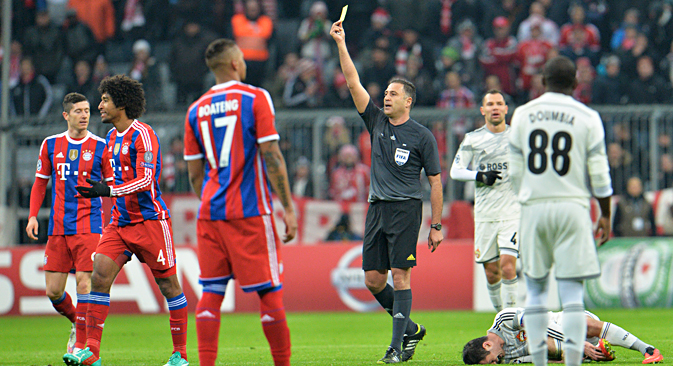
Bayern's Dante from Brazil, second left, is booked by referee Olegario Benquerenca after he fouled CSKA's Alan Dzagoev, right, during the Champions League group E soccer match between FC Bayern Munich and CSKA Moscow in Munich, Germany, Wednesday, Dec. 10, 2014. Source: AP
So Russia’s Champions League dream is over for another year.
With reigning Russian champion CSKA Moscow’s 3-0 loss to Bayern Munich on Wednesday, the last chance of Russian participation in the knockout stages was snuffed out. A day earlier, Russian league leader Zenit St. Petersburg had been eliminated from the Champions League after a 2-0 loss to Monaco.
It was a rather meek end to a very disappointing year for Russian football, although at least CSKA and Zenit had put up a good fight as they battled to get out of their groups.
The same could not be said for the Russian national team at this summer’s World Cup. In what was supposed to be a chance for Russia to flex its muscles ahead of hosting the tournament in 2018, it proved something of a weakling, failing to earn a win against Belgium, Algeria or South Korea, none of them superpowers of the game.
After the tournament, the team dissolved into recriminations. Russian politicians piled the blame on lavishly-paid Fabio Capello, whose reported $11 million-a-year deal with Russia makes him the highest-paid national team coach in the world, without the results to match. Capello, for his part, focused his anger on a laser pointer aimed at Russia goalkeeper Igor Akinfeev by a rogue Algerian fan, rather than admitting any tactical mistakes.
Worse was to come as Russia started qualification for the 2016 European championship poorly, losing to Austria and failing to beat tiny Moldova, and now sits third in its group, outside the automatic qualifying places.
Capello’s Russia team finishes the year with one win in its last eight competitive matches, and that win came against Liechtenstein, just about the closest thing there is to a guaranteed win in world football.
Worse, the Russian national team is becoming famous not for its exploits on the pitch, but its problems in the boardroom. Capello has not been paid since June amid financial problems at the Russian Football Union.
The reasons are many and complex, partly the result of factional infighting at the Football Union and the Sports Ministry, but one thing is clear – hiring a famous foreign coach and then not paying him does not sit well with Russia’s ambitions to become a major football nation.
“After all, people are talking about the image of a country which will be hosting the World Cup in 2018,” Capello told the Tass agency on Dec. 9. “Believe me, it’s that which hurts me most in this situation, and not the financial discomfort at all.”
Capello has plenty of problems on his plate right now. Assuming he stays in his post (the Russian Sports Minister has promised he’ll be paid), Capello will have to start building a team for the 2018 World Cup. As I’ve written before for RBTH, that won’t be easy.
Many of Russia’s current key players will be too old in 2018, and there’s a real lack of young talent coming through, partly the delayed impact of the turbulence and poverty in Russian society in the 1990s, when young players would have been learning the game and entering youth academies.
The national team may be suffering from a litany of problems but at club level, things are (fortunately) healthier for Russian club football.
CSKA may not have qualified from its Champions League group, but the standard of football it played, including a famous win over Manchester City, was very creditable in a tough group that also contained Roma and Bayern Munich. In fact, had CSKA been given the much easier group that Zenit played in, with Bayer Leverkusen, Monaco and Benfica, there could easily have been a Russian team in the last 16.
That’s something of a reversal of their fates in the Russian Premier League this season, where Zenit has been the runaway league leader since the start of the season, going into the three-month winter break seven points clear of second-placed CSKA. However, both teams have suffered mixed form in recent weeks. The St. Petersburg club will also remember what happened last season, when CSKA was 10 points off the top before a remarkable run of wins allowed it to retain the title at Zenit’s expense.
Unfortunately, just as with the national team, off-field problems have overshadowed achievements on the pitch for Russian clubs. Repeated cases of racism by Russian fans earned CSKA sanctions from UEFA that forced it to play all of its Champions League home games in an empty stadium.
There have also been various cases of monkey chanting directed at black players during Russian league games. The Russian football authorities have commendably tightened up punishment for clubs whose fans abuse players, but have unfortunately also developed a worrying tendency to punish players who react to abuse.
The fall of the Russian currency, the ruble, has also caused problems for Russian clubs, most of whom have budgets in rubles but pay players in euros. The players are earning the same, but the cost to the clubs has shot up.
With a home World Cup on the horizon, Russian football is assured of a bright future, but this year that future has sometimes seemed rather a long way away. A combination of problems has made it a difficult year. Some of them are temporary afflictions, such as matters of on-pitch form, while others, especially the blight of racism in the stands, will require sustained effort to solve. That’s far from impossible, but it will require some of Russian football’s leaders to set aside their own disputes and work together.
All rights reserved by Rossiyskaya Gazeta.
Subscribe
to our newsletter!
Get the week's best stories straight to your inbox